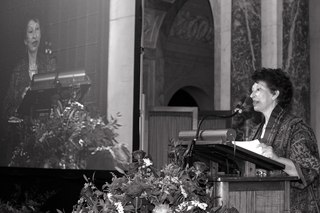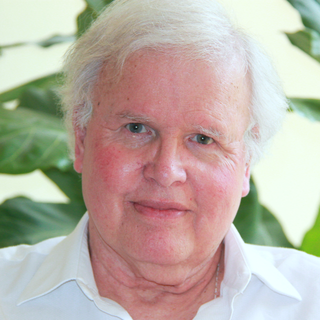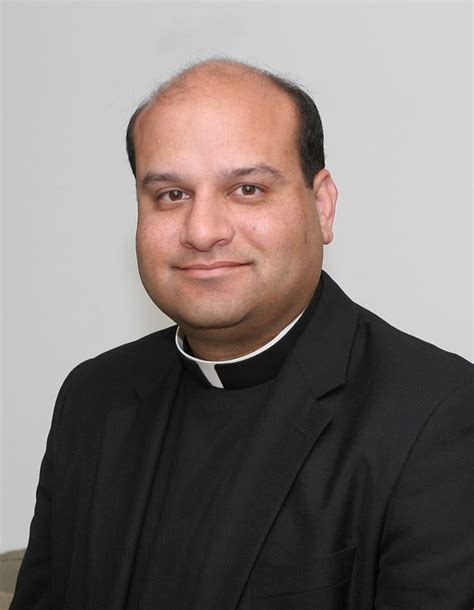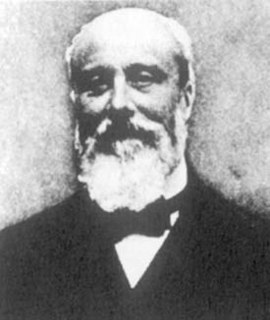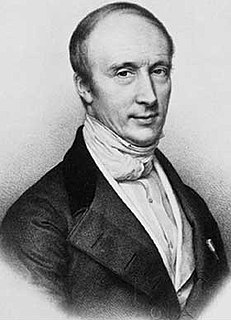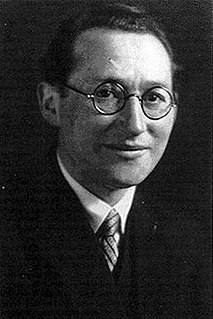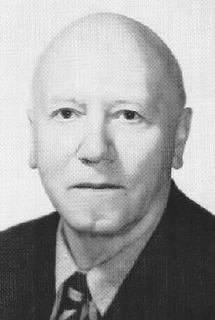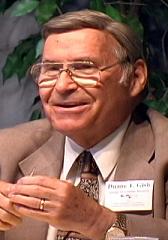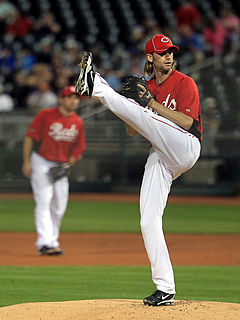Top 1050 Theories Quotes & Sayings - Page 17
Explore popular Theories quotes.
Last updated on November 19, 2024.
The quantum entered physics with a jolt. It didn't fit anywhere; it made no sense; it contradicted everything we thought we knew about nature. Yet the data seemed to demand it. ... The story of Werner Heisenberg and his science is the story of the desperate failures and ultimate triumphs of the small band of brilliant physicists who-during an incredibly intense period of struggle with the data, the theories, and each other during the 1920s-brought about a revolutionary new understanding of the atomic world known as quantum mechanics.
By putting the spotlight on the female child and framing her as the ideal of beauty, he condemns the mature woman to invisibility. In fact, the modern Western man enforces Immanuel Kant's nineteenth-century theories: To be beautiful, women have to appear childish and brainless. When a woman looks mature and self-assertive, or allows her hips to expand, she is condemned ugly. Thus, the walls of the European harem separate youthful beauty from ugly maturity.
I observe that there are two entirely different theories according to which individual men seek to get on in the world. One theory leads a man to pull down everybody around him in order to climb up on them to a higher place. The other leads a man to help everybody around him in order that he may go up with them.
My main professional interest during the 1970s has been in the dramatic change of concepts and ideas that has occurred in physics during the first three decades of the century, and that is still being elaborated in our current theories of matter. The new concepts in physics have brought about a profound change in our world view; from the mechanistic conception of Descartes and Newton to a holistic and ecological view, a view which I have found to be similar to the views of mystics of all ages and traditions.
An excellent plumber is infinitely more admirable than an incompetent philosopher. The society which scorns excellence in plumbing because plumbing is a humble activity and tolerates shoddiness in philosophy because it is an exalted activity will have neither good plumbing nor good philosophy. Neither its pipes nor its theories will hold water.
War to me is very much like sex. You can develop a theory that says sex is primarily for the exchange of genetic material, or that it's a celebration of life, or you can make up 50,000 theories about why human beings have sex, all of which are in some sense true, all of which by themselves miss the point. Because the answer is extraordinarily complex. It may be for fun, it may be for reproduction, for financial reasons, any number of things.
Reshaping life! People who can say that have never understood a thing about life—they have never felt its breath, its heartbeat—however much they have seen or done. They look on it as a lump of raw material that needs to be processed by them, to be ennobled by their touch. But life is never a material, a substance to be molded. If you want to know, life is the principle of self-renewal, it is constantly renewing and remaking and changing and transfiguring itself, it is infinitely beyond your or my obtuse theories about it.
I have nothing but myself to write about, no facts, no theories, no opinions, no adventures, no sentiments, nothing but my own poor barren individualism, of considerable interest to me, but I do not know why I should presume it will be so to you. Egotism is not tiresome, or it ought not to be, if one is sincere about oneself; but it is so hard to be sincere. Well, never mind, I mean to be, and you know me well enough to see through me when I am humbugging.
I never wavered in my certainty that God did not exist. I was simply liberated by the thought that there might be a way to engage with religion without having to subscribe to its supernatural content - a way, to put it in more abstract terms, to think about Fathers without upsetting my respectful memory of my own father. I recognized that my continuing resistance to theories of an afterlife or of heavenly residents was no justification for giving up on the music, buildings, prayers, rituals, feasts, shrines, pilgrimages, communal meals and illustrated manuscripts of the faiths.
Once a new social stage appears in a culture, it will spread its instructional codes and life-priority messages throughout that culture's surface-level expressions: religion, economic and political arrangements, psychological and anthro-pological theories, and views of human nature, our future destiny, globalization, and even architectural patterns and sports preferences. We all live in flow states; there is always new wine, always old wineskins. We, indeed, find ourselves pursuing a neverending quest.
Science does not rest upon solid bedrock. The bold structure of its theories rises, as it were, above a swamp. It is like a building erected on piles. The piles are driven down from above into the swamp, but not down to any natural or 'given' base; and if we stop driving the piles deeper, it is not because we have reached firm ground. We simply stop when we are satisfied that the piles are firm enough to carry the structure, at least for the time being.
I spent most of my teen years trying to figure out the rules of life, theories for why things happened, why people behaved as they did, and mostly I came to the conclusion that either there were no rules, or the rules sucked. Reading science fiction wasn't about imagining myself into some more exciting life filled with adventure, it was about finding a world where things worked the way I wanted them to.
In this country, unfortunately, as all over the world, we care so little, we have no deep feeling about anything. Most of us are intellectual-intellectuals in the superficial sense of being very clever, full of words and theories about what is right and what is wrong, about how we should think, what we should do. Mentally we are highly developed, but inwardly there is very little substance or significance; and it is this inward substance that brings about true action, which is not action according to an idea.
There are all sorts of institutions in the economic world which depart from the simple price/market model which I worked on in an earlier incarnation and which has been sort of the mainstream of economic theories since Adam Smith and David Ricardo. There are all sorts of contractual relations between firms and individuals which do not conform to the simple price theory - profit-sharing schemes and so forth - and the explanation for these suddenly became clear. We now understand why these emerged and that they are based on differences in information in the economy.
We have to work sincerely and responsibly to thwart any attempt to divide the Arab nation into small groups, with which foreign countries would deal separately. This would eventually be in the interests of Zionism, which stands behind such policies, formulating the relevant theories and promoting distorted information to world politicians, especially in the West, in order to make them adopt an approach which is harmful to the Arab nation and is even against the legitimate interests of their own countries.
Odonianism is anarchism. Not the bomb-in-the-pocket stuff, which is terrorism, whatever name it tries to dignify itself with, not the social-Darwinist economic 'libertarianism' of the far right; but anarchism, as prefigured in early Taoist thought, and expounded by Shelley and Kropotkin, Goldman and Goodman. Anarchism's principal target is the authoritarian State (capitalist or socialist); its principle moral-practical theme is cooperation (solidarity, mutual aid). It is the most idealistic, and to me the most interesting, of all political theories.
Bealer argues that the kind of naturalistic view which Quine holds will rob him of the ability to make the normative claims which (many) naturalists wish to make in epistemology. I don't think this is right about Quine, but I'm certain it's not right about my own view. To the extent that I can show that talk of knowledge is firmly rooted within empirical theories where it plays an important explanatory role, I thereby demonstrate its naturalistic credentials.
While the poet entertains he continues to search for eternal truths, for the essence of being. In his own fashion he tries to solve the riddle of time and change, to find an answer to suffering, to reveal love in the very abyss of cruelty and injustice. Strange as these words may sound I often play with the idea that when all the social theories collapse and wars and revolutions leave humanity in utter gloom, the poet--whom Plato banned from his Republic--may rise up to save us all.
In general, the questions that are on our mind are the same questions that have been driving our work over the past decade. How do we bring order to this messy, unpredictable world of innovation? How can we dramatically improve the chances of creating a successful new-growth business? How can we do this again and again? More specifically, it has become very clear that the fundamental paradigms of market segmentation and branding are badly broken - and we're working on developing more useful theories for these dimensions of innovation.
In restating this basic Christian doctrine, Benedict argues that it is not only for Christians alone. Others may not share the Christian faith in God, but the Christian proclamation that hope comes from within the person- in the realm of faith and conscience - is for them too. It offers an important protection against stifling and occasionally brutal social systems built on false hopes that come from outside the person, founded on political idealogies, economic models and social theories.
There are all sorts of theories and ideas about what constitutes a good opening line. It's tricky thing, and tough to talk about because I don't think conceptually while I work on a first draft -- I just write. To get scientific about it is a little like trying to catch moonbeams in a jar. But there's one thing I'm sure about. An opening line should invite the reader to begin the story. It should say: Listen. Come in here. You want to know about this.
No theory ever benefited by the application of data, Amy. Data kills theories. A theory has no better time than when it's lying there naked, pure, unsullied by facts. Let's just keep it that way for a while." "So you don't really have a theory?" "Clueless." "You lying bag of fish heads." "I can fire you, you know. Even if Clay was the one that hired you, I'm not totally superfluous to this operation yet. I'm kind of in charge. I can fire you. Then how will you live?" "I'm not getting paid." "See, right there. Perfectly good concept ruined by the application of fact.
The scientists from Franklin to Morse were clear thinkers and did not produce erroneous theories. The scientists of today think deeply instead of clearly. One must be sane to think clearly, but one can think deeply and be quite insane. Today's scientists have substituted mathematics for experiments, and they wander off through equation after equation, and eventually build a structure which has no relation to reality.
[T]ruly grand and powerful theories [...] do not and cannot rest upon single observations. Evolution is an inference from thousands of independent sources, the only conceptual structure that can make unified sense of all this disparate information. The failure of a particular claim usually records a local error, not the bankruptcy of a central theory. [...] If I mistakenly identify your father's brother as your own dad, you don't become genealogically rootless and created de novo. You still have a father; we just haven't located him properly.
I do not deny that medicine is a gift of God, nor do I refuse to acknowledge science in the skill of many physicians; but, take the best of them, how far are they from perfection? A sound regimen produces excellent effects. When I feel indisposed, by observing a strict diet and going to bed early, I generally manage to get round again, that is, if I can keep my mind tolerably at rest. I have no objection to the doctors acting upon certain theories, but, at the same time, they must not expect us to be the slaves of their fancies.
Thus the criminal ceases to be a person, a subject of rights and duties, and becomes merely an object on which society can work. And this is, in principle, how Hitler treated the Jews. They were objects; killed not for ill desert but because, on his theories, they were a disease in society. If society can mend, remake, and unmake men at its pleasure, its pleasure may, of course, be humane or homicidal. The difference is important. But, either way, rulers have become owners.
Now these two questions Does there exist a material reality distinct from sensible appearances? and What is the nature of reality? do not have their source in experimental method, which is acquainted only with sensible appearances and can discover nothing beyond them. The resolution of these questions transcends the methods used by physics; it is the object of metaphysics. Therefore, if the aim of physical theories is to explain experimental laws, theoretical physics is not an autonomous science; it is subordinate to metaphysics.
Work on causal theories of knowledge - early work by Armstrong, and Dretske, and Goldman - seemed far more satisfying. As I started to see the ways in which work in the cognitive sciences could inform our understanding of central epistemological issues, my whole idea of what the philosophical enterprise is all about began to change. Quine certainly played a role here, as did Putnam's (pre-1975) work in philosophy of science, and the exciting developments that went on in that time in philosophy of mind.
No one can predict whether the earth will be cooler or hotter next year, let alone do anything to change it. If you're afraid of global warming, turn off the lights when you leave the room - but don't participate in the corruption of science, don't scare our kids with unproven cataclysmic theories, and don't try to ban economic energy sources that people living on this planet depend upon today. And don't try to stop progress; it's the only hope the earth has of seeing clean industry, short of exterminating mankind.
If a psychological Maxwell devises a general theory of mind, he may make it possible for a psychological Einstein to follow with a theory that the mental and the physical are really the same. But this could happen only at the end of a process which began with the recognition that the mental is something completely different from the physical world as we have come to know it through a certain highly successful form of detached objective understanding. Only if the uniqueness of the mental is recognized will concepts and theories be devised especially for the purpose of understanding it.
First, it is necessary to study the facts, to multiply the number of observations, and then later to search for formulas that connect them so as thus to discern the particular laws governing a certain class of phenomena. In general, it is not until after these particular laws have been established that one can expect to discover and articulate the more general laws that complete theories by bringing a multitude of apparently very diverse phenomena together under a single governing principle.
The history of acceptance of new theories frequently shows the following steps: At first the new idea is treated as pure nonsense, not worth looking at. Then comes a time when a multitude of contradictory objections are raised, such as: the new theory is too fancy, or merely a new terminology; it is not fruitful, or simply wrong. Finally a state is reached when everyone seems to claim that he had always followed this theory. This usually marks the last state before general acceptance.
A … difference between most system-building in the social sciences and systems of thought and classification of the natural sciences is to be seen in their evolution. In the natural sciences both theories and descriptive systems grow by adaptation to the increasing knowledge and experience of the scientists. In the social sciences, systems often issue fully formed from the mind of one man. Then they may be much discussed if they attract attention, but progressive adaptive modification as a result of the concerted efforts of great numbers of men is rare.
There have always been two theories about inequality. One is that it reflects just deserts. The other is that there are large elements of exploitation and inequality of opportunities. The evidence is overwhelmingly that the increase in inequality is associated with those negative factors. If it were all social contribution, then when the top did better, they would be contributing to everybody's well-being. That trickle-down hasn't happened. We've seen median income, people in the middle, actually worse off than they were 25 years ago.
We could speak about the meaning of life vis-a-vis non-consequential/deontological theories, apodictic transformation schemata, the incoherence of exemplification, metaphysical realism, Cartesian interactive dualism, revised non reductive dualism, postmodernist grammatology and dicey dichotomies. But we would still be left with Nietzsche's preposterous mustache which instills great anguish and skepticism in the brain, which leads (as it did in his case) to utter madness. I suggest we go to Paris instead.
It is clear that everybody interested in science must be interested in world 3 objects. A physical scientist, to start with, may be interested mainly in world 1 objects--say crystals and X-rays. But very soon he must realize how much depends on our interpretation of the facts, that is, on our theories, and so on world 3 objects. Similarly, a historian of science, or a philosopher interested in science must be largely a student of world 3 objects.
You can go to doctors until the last cow has been placed in its shed. You can journey the earth in search of peace of mind. You can experiment with a dozen theories, hoping for a relief from worries, or the problems which beset you, but unless you learn to relax you will end up disappointed. Tension is a killer! Just relax and note the immediate effect. One of peace and ease of mind. One in which every organ of the body joins. In relaxation there is unity of mind, body and spirit.
With such global events looming over us like mountains, nay, like entire mountain ranges, it may seem incongruous and inappropriate to recall that the primary key to our being or non-being resides in each individual human heart, in the heart’s preference for specific good or evil. Yet this remains true even today, and it is, in fact, the most reliable key we have. The social theories that promised so much have demonstrated their bankruptcy, leaving us at a dead end.
In spite of the fact that religion looks backward to revealed truth while science looks forward to new vistas and discoveries, both activities produce a sense of awe and a curious mixture of humility and arrogance in their practitioners. All great scientists are inspired by the subtlety and beauty of the natural world that they are seeking to understand. Each new subatomic particle, every unexpected object, produces delight and wonderment. In constructing their theories, physicists are frequently guided by arcane concepts of elegance in the belief that the universe is intrinsically beautiful.
My primary early interest was in marketing and my aim was to improve its theories, methods and tools. Early on I pressed companies to adopt a consumer orientation and to be in the value creation business. I didn't pay much attention to the social responsibilities of business until later. Now I am pressing companies to address the triple bottom line: people, the planet, and profits. I found that companies were too much into short term profit maximization and they needed to invest more in sustainability thinking.
During the lifetime of great revolutionaries, the oppressing classes constantly hounded them, received their theories with the most savage malice, the most furious hatred and the most unscrupulous campaigns of lies and slander. After their death, attempts are made to convert them into harmless icons, to canonize them, so to say, and to hallow their names to a certain extent for the “consolation” of the oppressed classes and with the object of duping the latter, while at the same time robbing the revolutionary theory of its substance, blunting its revolutionary edge and vulgarizing it.
Muhammad professed to derive from Heaven, and he has inserted in the Koran, not only a body of religious doctrines, but political maxims, civil and criminal laws, and theories of science. The gospel, on the contrary, only speaks of the general relations of men to God and to each other - beyond which it inculcates and imposes no point of faith. This alone, besides a thousand other reasons, would suffice to prove that the former of these religions will never long predominate in a cultivated and democratic age, whilst the latter is destined to retain its sway at these as at all other periods.
This is no magnificent deed, because I do not want followers, and I mean this. The moment you follow someone you cease to follow Truth. I am not concerned whether you pay attention to what I say or not. I want to do a certain thing in the world and I am going to do it with unwavering concentration. I am concerning myself with only one essential thing: to set man free. I desire to free him from all cages, from all fears, and not to found religions, new sects, nor to establish new theories and new philosophies.
Through spontaneity we are re-formed into ourselves. It creates an explosion that for the moment frees us from handed-down frames of reference, memory choked with old facts and information and undigested theories and techniques of other people's findings. Spontaneity is the moment of personal freedom when we are faced with reality, and see it, explore it and act accordingly. In this reality the bits and pieces of ourselves function as an organic whole. It is the time of discovery, of experiencing, of creative expression.
The material which a scientist actually has at his disposal, his laws, his experimental results, his mathematical techniques, his epistemological prejudices, his attitude towards the absurd consequences of the theories which he accepts, is indeterminate in many ways, ambiguous, and never fully separated from the historical background . This material is always contaminated by principles which he does not know and which, if known, would be extremely hard to test.
...By a 'silly' theory I mean one which may be held at the time when one is talking or writing professionally, but which only an inmate of a lunatic asylum would think of carrying into daily life. ... It must not be supposed that the men who maintain these theories and beliefs are 'silly' people. Only very acute and learned men could have thought of anything so odd or defended anything so preposterous against the continual protests of common sense.
Scientific theories never dictate human values, but they can often cast new light on ethical issues. From a sexual selection viewpoint, moral philosophy and political theory have mostly been attempts to shift male human sexual competitiveness from physical violence to the peaceful accumulation of wealth and status. The rights to life, liberty, and property are cultural inventions that function, in part, to keep males from killing and stealing from one another while they compete to attract sexual partners.
There ought not be two histories, one of political and moral action and one of political and moral theorizing, because there were not two pasts, one populated only by actions, the other only by theories. Every action is the bearer and expression of more or less theory-laden beliefs and concepts; every piece of theorizing and every expression of belief is a politcal and moral action.
It must be conceded that a theory has an important advantage if its basic concepts and fundamental hypotheses are 'close to experience,' and greater confidence in such a theory is certainly justified. There is less danger of going completely astray, particularly since it takes so much less time and effort to disprove such theories by experience. Yet more and more, as the depth of our knowledge increases, we must give up this advantage in our quest for logical simplicity in the foundations of physical theory.
A popular feel for scientific endeavors should, if possible, be restored given the needs of the twenty-first century. This does not mean that every literature major should take a watered-down physics course or that a corporate lawyer should stay abreast of quantum mechanics. Rather, it means that an appreciation for the methods of science is a useful asset for a responsible citizenry. What science teaches us, very significantly, is the correlation between factual evidence and general theories, something well illustrated in Einstein's life.
The scientific theorist is not to be envied. For Nature, or more precisely experiment, is an exorable and not very friendly judge of his work. It never says "yes" to a theory. In the most favorable cases it says "Maybe," and in the great majority of cases simply "No." If an experiment agrees with a theory it means for the latter "Maybe," and if it does not agree it means "No." Probably every theory will some day experience its "No" - most theories, soon after conception.
"Methodological naturalism" and "metaphysical naturalism" are terms that often surface in the continuing battle between evolutionary biology and creationism/intelligent design. The methodological thesis says that scientific theories shouldn't postulate supernatural entities; the metaphysical thesis says that no such entities exist. In this debate, God is the supernatural entity at issue; the question isn't whether science gets to talk about mathematical entities if Platonism is correct.
We know that a statement proved to be good must be oorrect. New thoughts are constantly obtaining the floor. These two theories - that all is matter, or that all is Mind-will dispute the ground, until one is acknowledged to be the victor. Discussing his campaign, General Grant said: "I propose to fight it out on this line, if it takes all summer." Science says: All is Mind and Mind's idea. You must fight it out on this line. Matter can afford you no aid.
The full implications of feminism will evolve over time, as we organize, experiment, think, analyze, and revise our ideas and strategies in light of our experiences. No theory emerges in full detail overnight; the dominant theories of our day have expanded and changed over many decades. That it will take time should not discourage us. That we might fail to pursue our ideas - given the enormous need for them in society today - is unconscionable.
Of all the statements that have been made with respect to theories on the origin of life, the statement that the Second Law of Thermodynamics poses no problem for an evolutionary origin of life is the most absurd… The operation of natural processes on which the Second Law of Thermodynamics is based is alone sufficient, therefore, to preclude the spontaneous evolutionary origin of the immense biological order required for the origin of life.
I always say Manny [Ramirez] is a strange guy. Outwardly, he's happy-go-lucky. On the inside, he's got a lot of conspiracy theories going on. I would say Manny might be one of these guys when he's 50 years old, he might be in his house with all the blinds shut kind of looking out like the CIA's out there. You don't know, man. I mean, you don't know what's going on in the interior with him. So you don't worry about it.
Now, because he knows that his economic theories don't work, he's been spending these last few days calling me every name in the book. Lately he's called me a socialist for wanting to roll-back the Bush tax cuts for the wealthiest Americans so we can finally give tax relief to the middle class. I don't know what's next. By the end of the week he'll be accusing me of being a secret communist because I shared my toys in kindergarten. I shared my peanut butter and jelly sandwich.
Science fiction - and the correct shortcut is 'sf' - uses actual scientific facts or theories for the source ideas or framework of the story. It has some scientific content, however speculative. If it breaks a law of physics, it knows it's doing so and follows up the consequences. If it invents a society of aliens, it does so with some respect for and knowledge of the social sciences and what you might call social probabilities. And some of it is literarily self-aware enough to treat its metaphors as metaphors.
I firmly believe that the method which sets theological theories against scientifically ascertained facts, is fatal to the current theology and injurious to the spirit of religion; and that the method which frankly recognizes the facts of life, and appreciates the spirit of the scientists whose patient and assiduous endeavor has brought those facts to light, will commend the spirit of religion to the new generation, and will benefit--not impair--theology as a science, by compelling its reconstruction.

